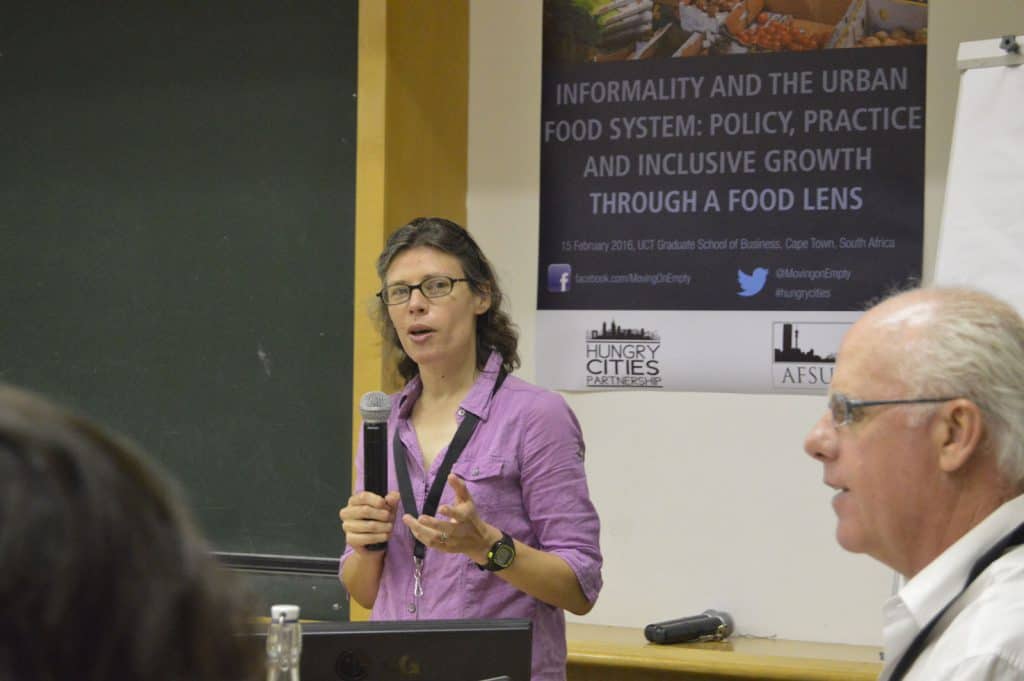
Dr Jane Battersby-Lennard
The informal economy is a critical access point for food for most poor urban communities. This was the prevailing theme at a workshop held on 15 February 2016, titled: “Informality and the urban food system: Policy, practice and inclusive growth through a food lens.”
Presenters – many of whom are affiliated to the DST-NRF Centre of Excellence in Food Security (CoE-FS) – shared their views and research about urban food insecurity and informal trade across the globe, including Cape Town. Not only does the informal sector provide livelihoods for the poor and marginalized, it has a role to play in strategies to address the challenge of food insecurity.
Informal traders are found predominantly in places accessible to the urban poor, such as at taxi ranks. These traders sell food and other goods at competitive prices, have long operating hours, and offer other advantages to city residents.
Informal trade – a lifeline for the urban poor
A 2013 mapping of food retailers showed that despite the rapid expansion of supermarkets in low-income areas, people still buy food from informal traders, explained Dr Jane Battersby Lennard. This is because “the informal sector grants credit to people who run out of money towards the end of the month. It is a safety net to those who would otherwise be unable to buy food,” explained Dr Battersby-Lennard. This is a vital lifeline for many of the urban poor, and helps address food security challenges for the urban poor. Dr Battersby-Lennard is based at the University of Cape Town’s (UCT) African Centre for Cities and is an affiliate of the CoE-FS.
Gendered impact of food insecurity
The impact of food insecurity is unevenly distributed among men and women. “In Cape Town, we found that female-headed houses are more food insecure than others,” said Mary Caesar, researcher at Balsillie School of International Affairs, Canada. This is despite findings that show that female-headed households engage more in the informal sector than male-headed households. Each geographical region also presents challenges to women participating in the sector, the biggest challenge for women is the issue of crime and safety.
Low margins, high turnover key to migrant trader success
Discussions also looked at migrant traders who form part of the South African urban informal economies. Some of these traders run successful businesses that can be attributed to “a business model of low margins and high turnover.”
For example, many Somali traders on South African cities procure food from wholesalers, therefore source it cheaper, and can therefore sell at competitive prices, said Vanya Gastrow of Wits University. These traders are also keenly aware of and cater to the needs of their customer base, she added. However, the constant threat of xenophobic attacks, compounded by lack of access to bank loans and other forms of credit, is among the many challenges faced by migrant traders operating in urban townships, says Dr Godfrey Tawodzera of the University of Limpopo and an affiliate of the CoE-FS).
Focus on production ignores other factors contributing to food insecurity
Another feature of the discussion was critique on approaches to address the challenge of food insecurity that focus mainly/only on production and ignores a myriad of contributing factors that limit access to food. To this end, Professor Jonathan Crush – head of the Hungry Cities Partnership – stressed the need to “transcend the view that equates food security with production,” he said.
The default position has always been that urban agriculture should be the focus of those working for increased food security and it’s difficult to break out of this
The workshop was organized by the Hungry Cities Partnership – a research partnership led by the African Centre for Cities at UCT and the Balsillie School of International Affairs at Wilfrid Laurier University, Waterloo, Canada. The cities involved are Bangalore, Cape Town, Kingston, Maputo, Mexico City, Nairobi and Nanjing. The focus of this five-year research programme is a collaborative, inter-disciplinary research, training and knowledge mobilization programme on urbanization, food security, informality and inclusive growth.
related Articles
South African cities face hunger and food insecurity as cost of living...
Originally published by the Mail&Guardian. “South Africa’s major cities are home to millions of people facing hunger and food insecurity…
Meet the grantee: Thato Mokgalagadi
Thato Mokgalagadi, a student currently doing her MSocSci Development Studies degree at CoE-FS co-host institution, the University of Pretoria. Photo:…
Food price hikes: Save money, support your local street trader
Fruit vendor in Church street, Johannesburg, South Africa. Photo: Ossewa/Wikimedia Commons. When Statistics South Africa (Stats SA) released the consumer…



